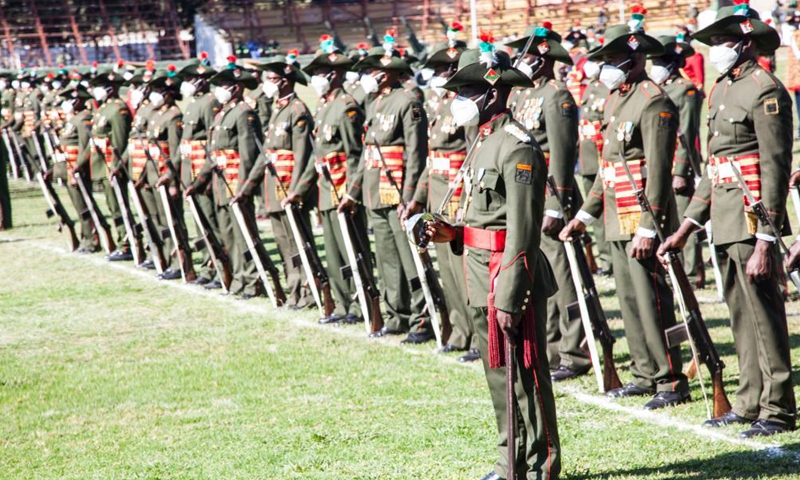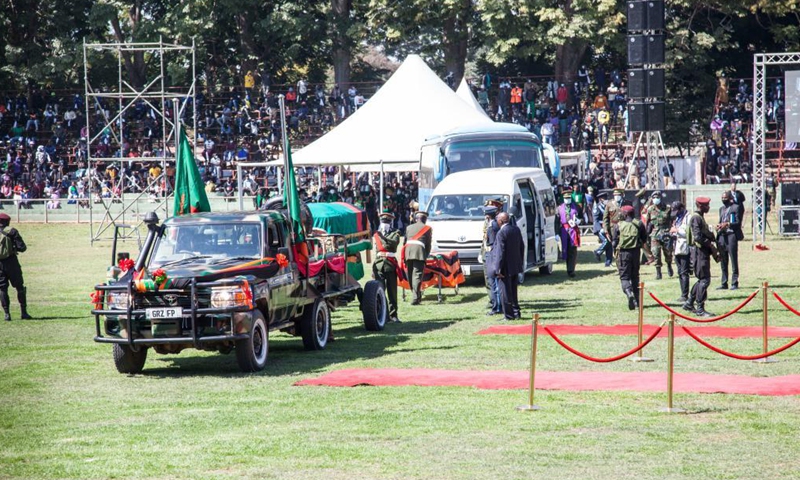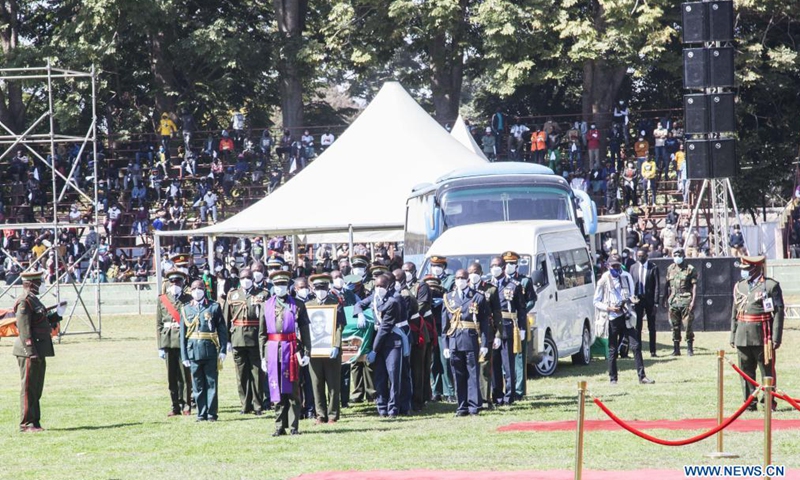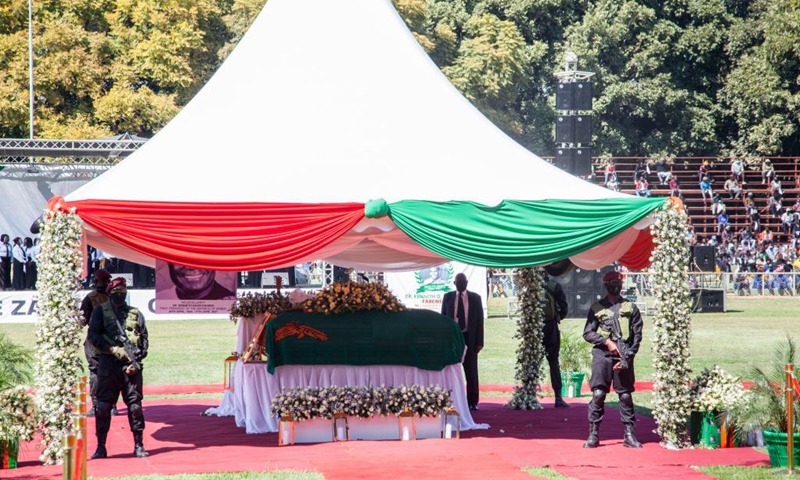
Soldiers stand at a state funeral for Zambia's first President Kenneth Kaunda in Lusaka, Zambia, on July 2, 2021. Zambia on Friday held a grand funeral for the country's first President Kenneth Kaunda.Photo:Xinhua

The casket of Zambia's first President Kenneth Kaunda arrives during a state funeral in Lusaka, Zambia, on July 2, 2021. Zambia on Friday held a grand funeral for the country's first President Kenneth Kaunda.Photo:Xinhua

Soldiers carry the casket of Zambia's first President Kenneth Kaunda during a state funeral in Lusaka, Zambia, on July 2, 2021. Zambia on Friday held a grand funeral for the country's first President Kenneth Kaunda.Photo:Xinhua

The casket of Zambia's first President Kenneth Kaunda is seen during a state funeral in Lusaka, Zambia, on July 2, 2021. Zambia on Friday held a grand funeral for the country's first President Kenneth Kaunda.Photo:Xinhua
Zambia on Friday held a grand funeral for the country's first President Kenneth Kaunda.
Held at the Show Grounds, a venue for holding agricultural and commercial shows in Lusaka, the country's capital, the state funeral attracted hundreds of people, including leaders from different parts of the world.
Kaunda, 97, died on June 17 and the government announced a 21-day mourning period. The mourning period included taking the body around all 10 provincial towns. However, attendance at the funeral on Friday was by invitation only due to the COVID-19 pandemic.
Zambian President Edgar Lungu led foreign dignitaries from various parts of the world, including some African presidents, during the state funeral.
A somber mood filled the Show Grounds main arena as Kaunda's casket entered, with many people waving white handkerchiefs, the trademark Kaunda was known for as a symbol of peace.
He was given full military honor mounted by the three defense forces which included a 21-gun salute and flypast of military jets. His casket was carried by brigadier generals from the country's defense forces.
All the dignitaries who spoke during the funeral had nothing but high praise for Kaunda for the contribution he made not only in Zambia but in Africa and the world as a whole.
Lungu described the former president as an African giant, pan-Africanist and freedom fighter who sacrificed for the good of humanity.
According to him, Kaunda left a legacy of nationalization and laid a foundation to educate the citizens immediately after independence.
He noted that Kaunda, like many other African forefathers, believed that Africans deserved to decide their own destiny and could not be discriminated hence their resolve to fight for the liberation of the continent.
"He was even more determined to ensure Africa was free. And indeed Africa was freed. Thanks to Dr. Kaunda and other leaders of his time, Africa is free," he said.
The Chairperson of the African Union (AU) Commission, Moussa Faki Mahamat described Kaunda as a unifier who worked tirelessly with other African leaders to emancipate Africa from colonial rule.
He said Zambia paid a heavy price for the liberation of other countries in the southern African region because of Kaunda's selflessness and thanked him for his sacrifice.
South African President Cyril Ramaphosa thanked Zambia and Kaunda for providing a sanctuary for Africans in the southern African region during the struggle for independence.
"South Africa is grateful for the support from Zambia. We will not be able to pay the debt we owe you," he said.
Kaunda led Zambia from 1964 when the country got its independence from Britain until 1991 when he lost elections. He is credited for using what he termed "positive non-violent action", a form of civil disobedience against the colonial masters until the country got its independence in October 1964.
After Zambia got its independence, Kaunda felt that the country's independence will not be complete as long as other countries in the southern African region were still in colonial rule.
He then embarked on a campaign to ensure that other countries got their independence. Zambia became a sanctuary for the freedom fighters running away from their countries.
Kaunda was among the first African leaders to establish the Organization of African Unity (OAU), the forerunner of the African Union (AU) to fight for freedom of the African continent.
It is because of his immense contribution to Africa's freedom struggle that the AU, during this year's African Day commemoration, awarded him a distinguished award for the role he played.
In 2002, South Africa bestowed on him the Order of the Companions of OR Tambo, one of the highest honors, in honor of his remarkable contribution to fighting the Apartheid regime in South Africa.
Apart from fighting for political freedom, Kaunda was also involved in the HIV/AIDS fight after retiring from politics. He formed the Kenneth Kaunda Children of Africa Foundation in order to contribute to the fight against the pandemic.
He came out in public and declared that one of his children died of HIV/AIDS, as a way to break the silence and stigma associated with the disease.
Due to his contribution to the fight against HIV/AIDS, Kaunda served as an ambassador for the Brothers for Life campaign to encourage more men to be tested for HIV. He retired from active politics in 1999.
In his earlier message of condolences, the Chinese Ambassador to Zambia Li Jie said Kaunda's death was a loss not only to Zambia and Africa, but also to the whole world. Zambia was the first country in the southern African region to forge diplomatic ties with China.
Li described Kaunda as an old friend, real friend and good friend of China. "Kaunda has been known and admired by the Chinese people for his wisdom and courage, and his extraordinary contributions to the China-Zambia friendship," he said.
The relationship reached an all-time high when China decided to help Zambia establish a trading route to the north of the country due to the blockade experienced in the south routes due to political tensions in the region.
China agreed to Kaunda's request and undertook the construction of the Tanzania-Zambia Railway (TAZARA). The 1,860 km railway line runs from the Zambian town of Kapiri Mposhi to Tanzania's Dar es Salaam. Since then, China has financed a number of huge projects across Zambia, which further deepened bilateral relations.
During the COVID-19 pandemic, China has responded positively and helped Zambia in terms of the provision of medical supplies, equipment and human resource.
